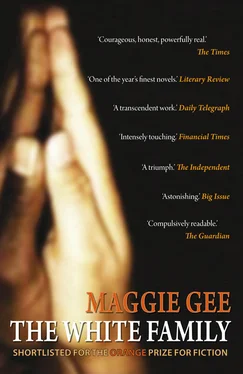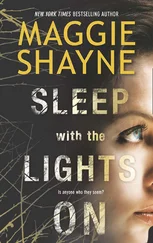‘Elroy, I’d never laugh at your faith.’
‘Your mother did.’
‘No — she was laughing at me . She thought it was my booklet.’
‘She was laughing at the Word of God.’
‘No, she was laughing at the English in that booklet.’
‘You people think you own the language —’
Elroy sounded more of a Londoner than her, unless he was excited or half-asleep. He didn’t come on like a Caribbean, unlike his mother and his older sister, and he usually insisted that there wasn’t an issue, so when he said You people , Shirley listened.
‘Elroy, I’m not white people, I’m me. Of course I won’t come, if you don’t want me.’
But afterwards he came back upset and said his mother had asked after her, and please would she go next week instead?
So tomorrow we both go to both churches, which is a bit over the top, in one day.
But I do love Jesus. Because He forgave me — He heard my voice, He heard my cry. The cords of death entangled me …
I do love God, because He saved me. I do love God, who made all things good … Jesus, who did not let me fall.
Shirley went gliding on down into the basement.
Here they kept China, Crystal, and Lighting, a cave of wonders next to food. As she moved, rainbows shot and glinted. An elderly man was shielding his eyes, while his wife blinked, startled, at a chandelier. Odd, all this brilliance, deep underground …
I tried to kill myself on the underground. Seventeen years ago. There was nothing left to live for. I had given up my daughter, given up college, given up hope of getting better. I remember wanting to sink so deep. Deeper and deeper and never come up.
My father was surprisingly good at first. He said something I’ve never forgotten. When I hate him most, I remember it. Because God is love. God is love …
I had the ironing-board in the front room. It was only a few days after I’d come home. I had felt too bad to get dressed in the morning, and I came down in my nightie, which was simply not done, we were never allowed to walk around in our night-clothes. I must have been slightly mad, at the time. And I went and put up the ironing-board, in the front room, not the kitchen, which again was very odd, the front room wasn’t for working in. And I got all the washing. There was a huge pile, and I’d brought some home from the hospital.
(They brought her to me to say goodbye. She had too many clothes; I couldn’t feel her body. I crushed her to me. ‘Don’t wake her,’ said the nurse, eyes on the baby. Flushed face, tiny hands lost in mittens. In a few seconds, she took her away. I stood there, frozen, then I followed them, slip-slop after them in stupid slippers, too late to get to them before the swing-doors. The nurse was taking her away downstairs. Her thin cruel back hid the baby from view, but I glimpsed a small crown with a whorl of pale hair, and one small hand, opening, closing.)
It must have been a Sunday. Dad had had his breakfast. I think Mum had gone to the allotment. He came in with his Sunday Express , sat in his armchair and began to read. As if he hadn’t seen me, but he must have done. I’d begun with the underwear — most of it was mine. All of it went into a neat flat pile. Then I did his shirts, which I’ve never found easy. Thank God Kojo never made a fuss about his shirts. Then I got to the sheets. They went on and on. It made my arms hurt, stretching them out, and the bits you’d already ironed got crumpled again. And I was upset because the stain was still there, the stain on the sheets where I had my show, the little rose of blood that meant she was coming. My mum must have bleached it, but it was still there. I wept and ironed, ironed and wept.
I realized Dad was watching me. Down at his paper, then up at me, then just staring at me, kind of helplessly. And then he got up and came towards me, raised his arm and I flinched away, because I knew I was doing the wrong thing, in the wrong place, at the wrong time. ‘Shirley,’ he said, but he couldn’t speak. Then he took the iron from my hand. ‘You’ll tire yourself out. Your dad’ll have a go. Come on, give it here. You have a sit down.’
‘You don’t know how to do it,’ I protested, but I did sit down, I think I would have fainted. He sized up the job, slowly, methodically, re-folded the sheet, began to work. He didn’t have a clue, but he did the job. ‘I was a soldier, girl. We looked after our kit.’ He ironed in silence, frowning, smiling. I sat and watched him. It was like a dream. Just before he finished, he spoke to me. Staring at the iron running over the cotton, his eyes never lifting, his voice breaking. ‘You’re a good girl, Shirley. I know you are. You know what they say? It’s the good girls get pregnant. The good girls get pregnant . So don’t take on.’
He did love me. And I must love him. Somewhere underneath all the anger and resentment, somewhere where all of us might have been different. A lost place, somewhere, I don’t know … I think Dad wished that he could have been different.
He couldn’t keep up the kindness, of course. Quite soon he thought I ought to pull myself together. Actually I think he was afraid that if I drifted on like that I would end up in a loony bin. Nothing like this had ever happened in our family, or so they kept on telling me (of course it must have done. Shamed into silence.)
They were very upset when I didn’t go back to college. Dad, of course, could only express it through anger. First a great roaring, when I made up my mind, then endless rumblings of discontent. ‘I hope you don’t think I can keep you … You had a great chance … You’re wasting your life … Pull yourself together! Haven’t you got any backbone? … Look at you, Shirley. You’ve let yourself go.’
It was true, I had. Even my mother noticed, my mother who never noticed people’s clothes. ‘I could wash that cardigan,’ she offered. ‘You could wear something else.’ ‘Leave me alone.’ She arranged an appointment at the hairdresser, but I didn’t go, and she was annoyed, Mum who rarely got annoyed. ‘You’re a pretty girl, Shirley, it’s a shame.’
My shame was deeper than anyone knew. I had let my daughter go deep underground, to a place from which there was no return.
One day I got up before nine o’clock, which pleased my mother. ‘Shirley, dear. You must be feeling better.’ ‘Yes,’ I said, but I ate no breakfast. ‘I’m going for a walk.’ ‘Comb your hair.’ I stared at her. She lived far away, behind the glass, breathing different air.
I walked down the road with my hair uncombed. I’m not sure I knew where I was going, but I remember walking quickly through the rain to the underground station, where I didn’t buy a ticket, because I didn’t know where I was going. I stood and shivered by the queue for tickets.
And then I knew there was nowhere to go. I went down to the platform of the north-bound trains. Going down the steps I met Ruby Millington, just coming back from her morning job, I think she was a lollipop lady at the school. Mum pitied her because they didn’t have children. (Perhaps that’s why she and George got so huge.) ‘Shirley,’ she said, ‘are you all right?’ ‘Fine,’ I told her. ‘You’re soaked,’ she said. ‘You haven’t got a coat.’ ‘Oh, I like rain.’ Her mouth opened again, but I pressed on down through the unfamiliar bodies, people who didn’t know my name, people who wouldn’t call me back from the special place where I was going.
I stood on the platform in a veil of rain. I looked into the tunnel. Which train would it be? Yellow eyes. They have yellow eyes. Thundering out of the underworld, thundering back down into the dark. It would be easy, a falling, an ending, gliding down where I could sink no further.
Читать дальше












